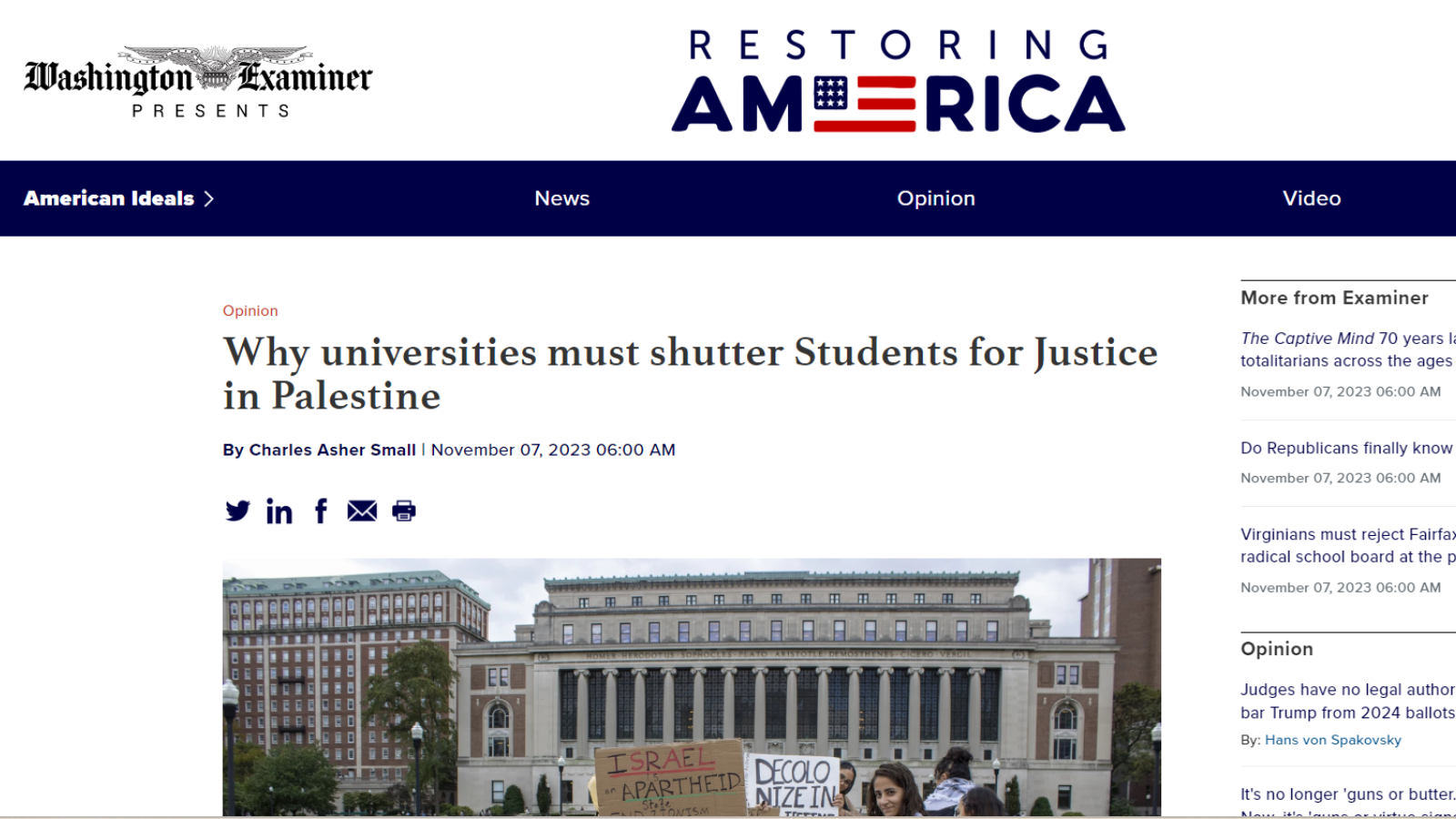“It has become a truism that whenever Israel is under attack, Jewish communities in the diaspora are also thrust into the firing line. In the three previous defensive wars that Israel has fought against the Hamas terrorist organization in Gaza since 2008, the clashes in the Middle East have been accompanied by venomous rhetoric, vandalism, and physical assaults targeting Jews abroad. This current war, the fourth, is no different in that regard, but the scale of the threat is much worse: In Germany, antisemitic incidents are up by 240%, in the United Kingdom by more than 1,000%, and here in the United States by nearly 400%, according to the Anti-Defamation League.
In these circumstances, the leaders of our civic institutions, particularly our universities and colleges of higher education, have a critical role to play in dampening tensions, fostering constructive dialog, setting standards for debate, and, ultimately, preventing the terrorists of Hamas and their backers in Iran from achieving their goal of creating as many fronts as possible, both military and intellectual, in their war to wipe Israel from the map.
There is an urgency here because the current tensions on campus generated by what are billed as “Palestine solidarity” protests cannot be adequately addressed within the conventional parameters of free speech and the freedom to protest. This approach carries with it several assumptions — that student societies are campus bodies carrying out lawful activities, that the campus is an ideal location to showcase and interrogate radical opinions, and that the university authorities can be trusted to safeguard students. These assumptions are, quite simply, untrue of the present situation.
The main student organization campaigning for an outcome to the conflict that results in Israel being displaced and replaced is Students for Justice in Palestine, which has a presence on more than 200 campuses in the U.S. Since the Hamas pogrom of murder, torture, rape, and kidnapping in southern Israel on Oct. 7, SJP has played a major part in whipping up a campus atmosphere that has left many Jewish students and faculty sick with fear. Physical attacks and antisemitic vandalism have been reported on many campuses, as well as shocking scenes — including one of Jewish students barricaded in the library at Cooper Union in New York as a howling pro-Hamas mob outside banged on the windows — that have rendered many seasoned observers of campus politics speechless. Many Jewish students are not reporting to class at some of our finest universities because of threats from students and, in some cases, intimidation by professors.
What university authorities need to understand is that scenes such as these are not the product of passions reaching fever pitch but of the strategy explicitly endorsed by SJP. A “toolkit” published by the organization just after the Hamas atrocities opened with a chilling endorsement of the bestial violence — rape, murder, and decapitation — unleashed by the terrorists, rebranding it as a “historic win for the Palestinian resistance” that had “broken down the artificial barriers of the Zionist entity, taking with it the facade of an impenetrable settler colony and reminding each of us that total return and liberation to Palestine is near.” This was not mere chilling rhetoric but a statement of SJP’s identity and mission: “We as Palestinian students in exile are PART of this movement, not in solidarity with this movement,” it continued emphatically. “All of our efforts continue the work and resistance of Palestinians on the ground.”
This is clear support of a designated terror organization, which is not legal.
Moreover, integral to that “resistance” is the violence glorified and lionized by SJP. If we are to take the organization at its word, then surely acting as “PART of this movement” and bringing the “resistance of Palestinians on the ground” to the U.S. is a call for similar tactics here?
Given that the U.S. has designated Hamas as a foreign terrorist organization since 1997, the presence on campus of a national organization that declares itself to be a “PART” of this movement and not just a vehicle of solidarity amounts to a glaring and dangerous incongruity. What is true in the outside world is no less true on campus: Hamas and its allies are as much terrorist organizations at Harvard or Northwestern as they are in Gaza or Tel Aviv. If students are declaring themselves to be extensions of these organizations, how can college administrators allow them to maintain status on campus?
In Florida, SJP chapters at the state’s universities have already been deactivated on precisely these grounds. “It is a felony under Florida law to ‘knowingly provide material support … to a designated foreign terrorist organization,’” State University System Chancellor Ray Rodrigues explained. Referring to the SJP toolkit, he observed, “Here, National SJP has affirmatively identified it is part of the Operation Al-Aqsa Flood — a terrorist-led attack.”
Regardless of domestic party politics, university leaders across the country would be well advised to adopt Florida’s approach. For any student society to be recognized, it must win its university’s approval as satisfying the school’s standards for certification. In the case of SJP, right now, that means universities giving their imprimatur to clubs embracing the rape and murder of Israelis and acceding to the ever-present threat of violence and hatred toward Jewish students, teachers, and their allies.
If we want to embolden antisemitism on campus further, and if we want the academy to fail in its most basic mission to turn out citizens of conscience, humanity, and intellectual integrity, then we should carry on with our current approach. But if we want to fulfill the academy’s historic mission, the leaders of our universities must light the way. This means deactivating SJP branches and making clear that the right of students to raise the plight of the Palestinians, whatever its cause, must never be tainted by confusing barbarism with resistance.”’

